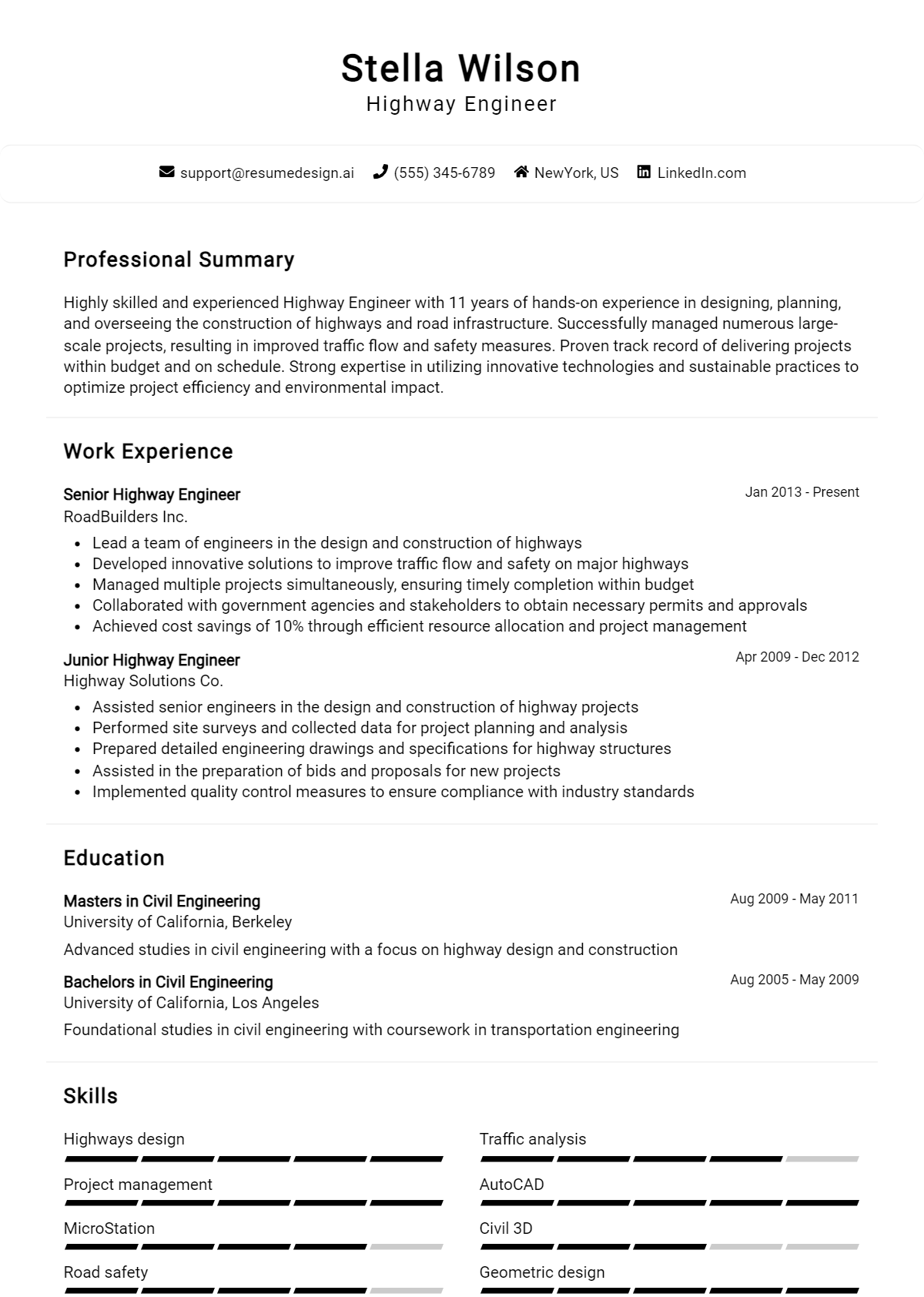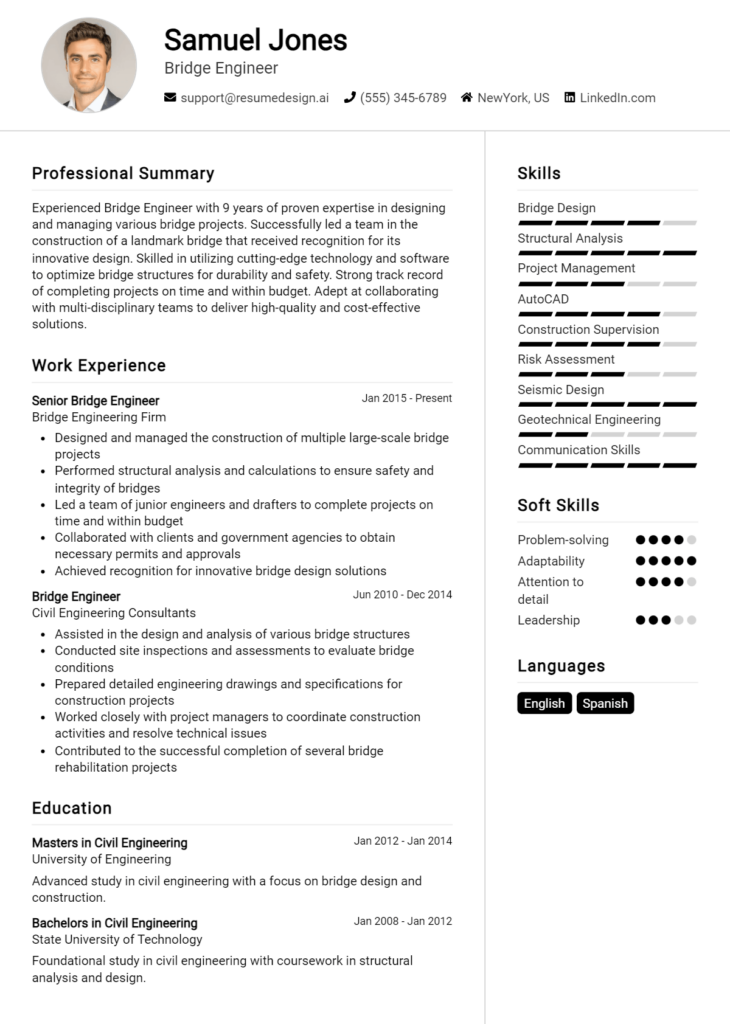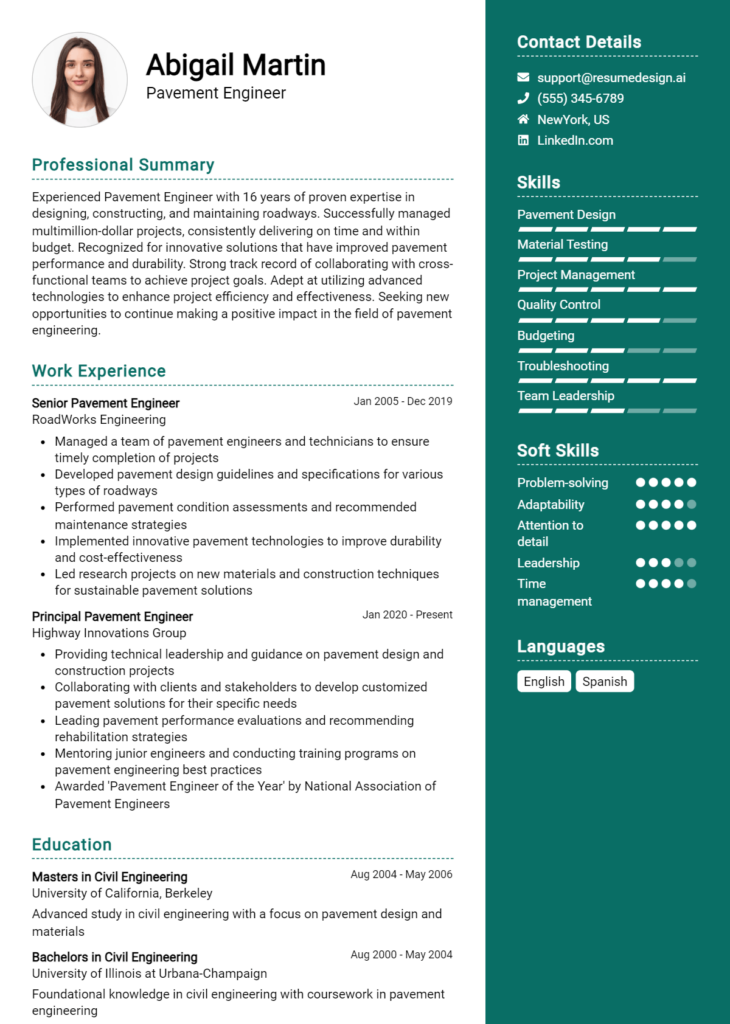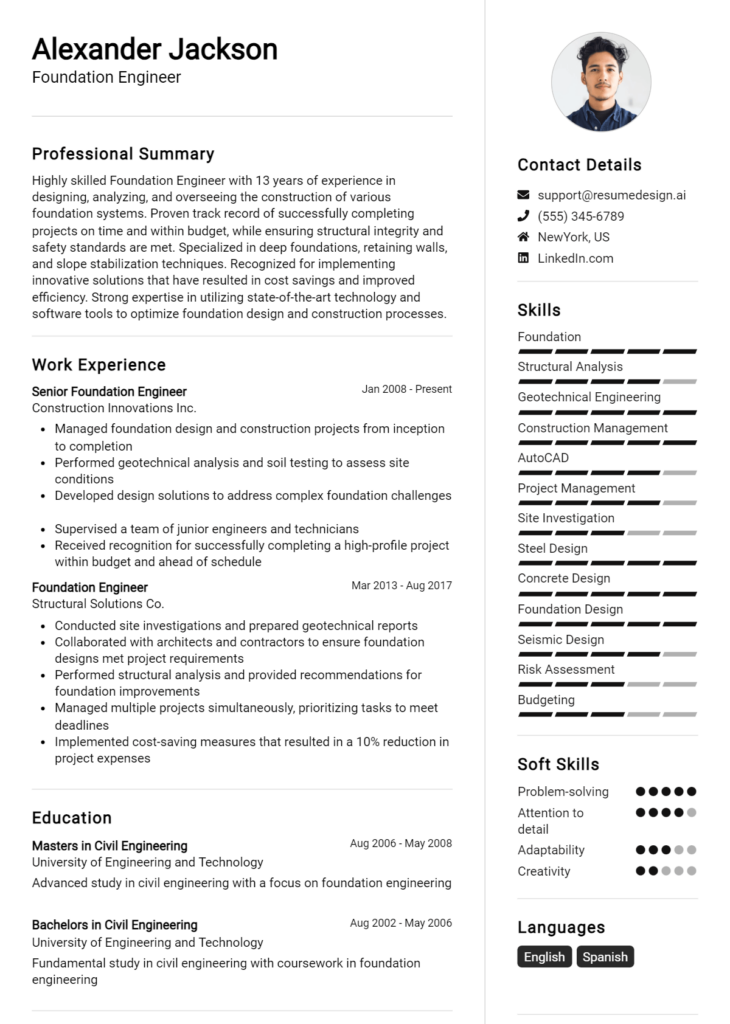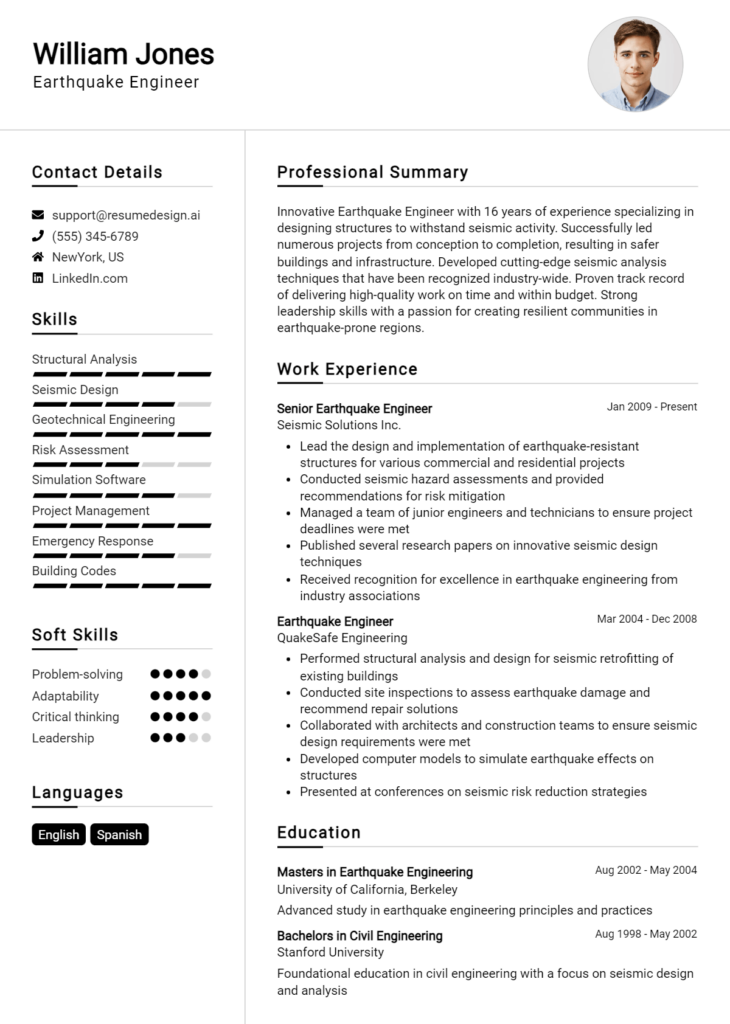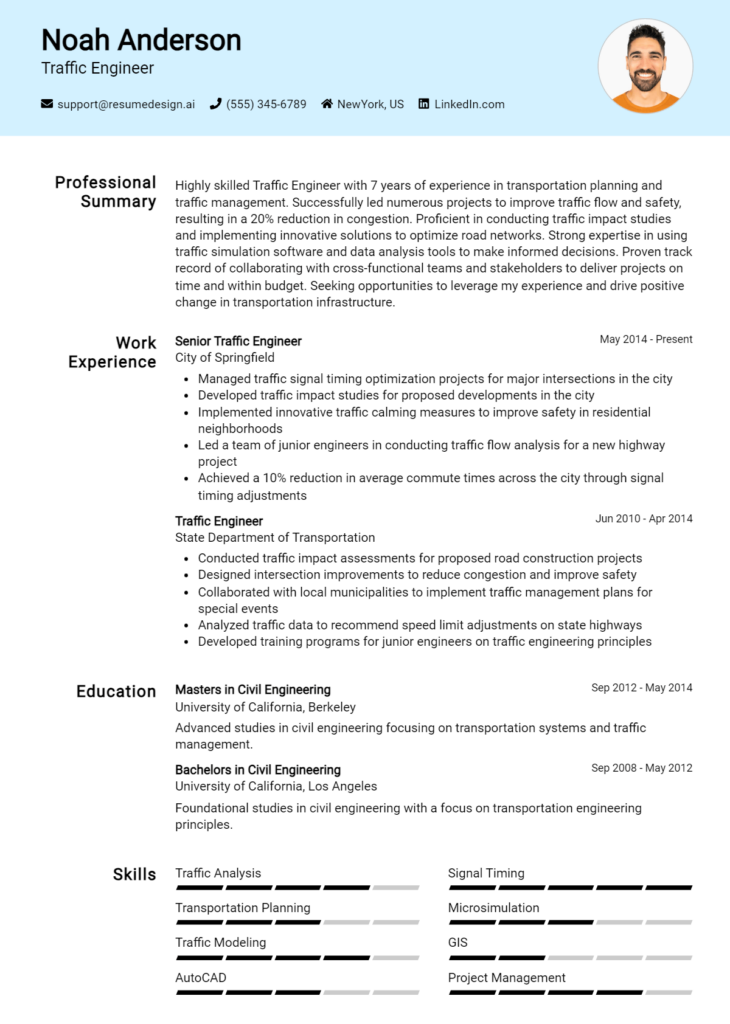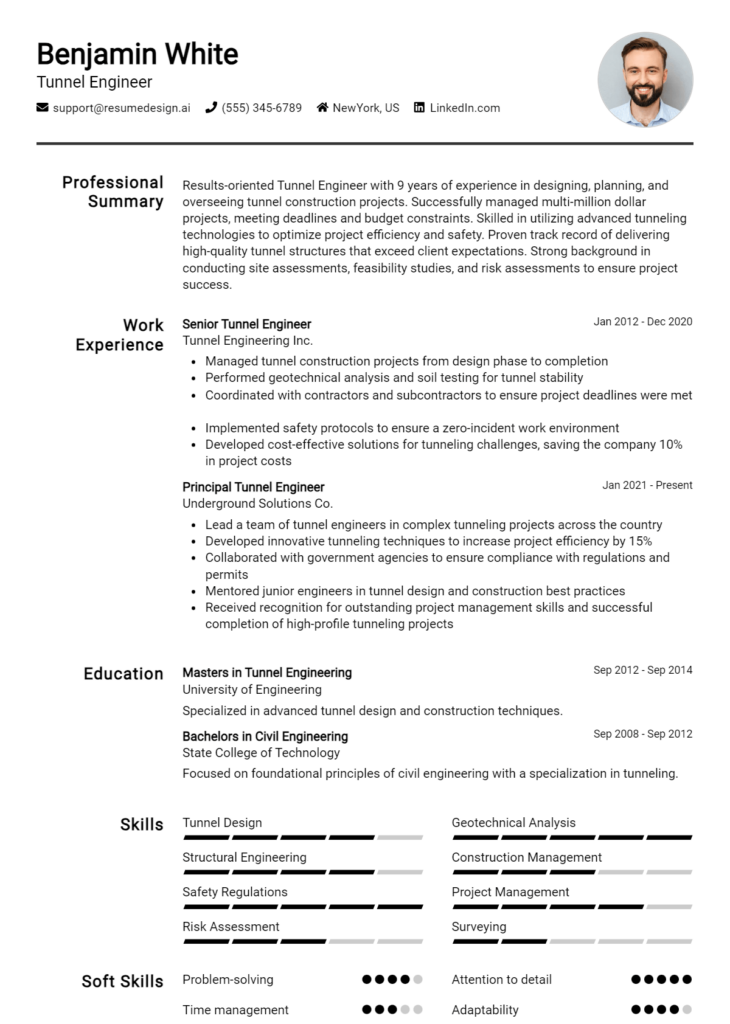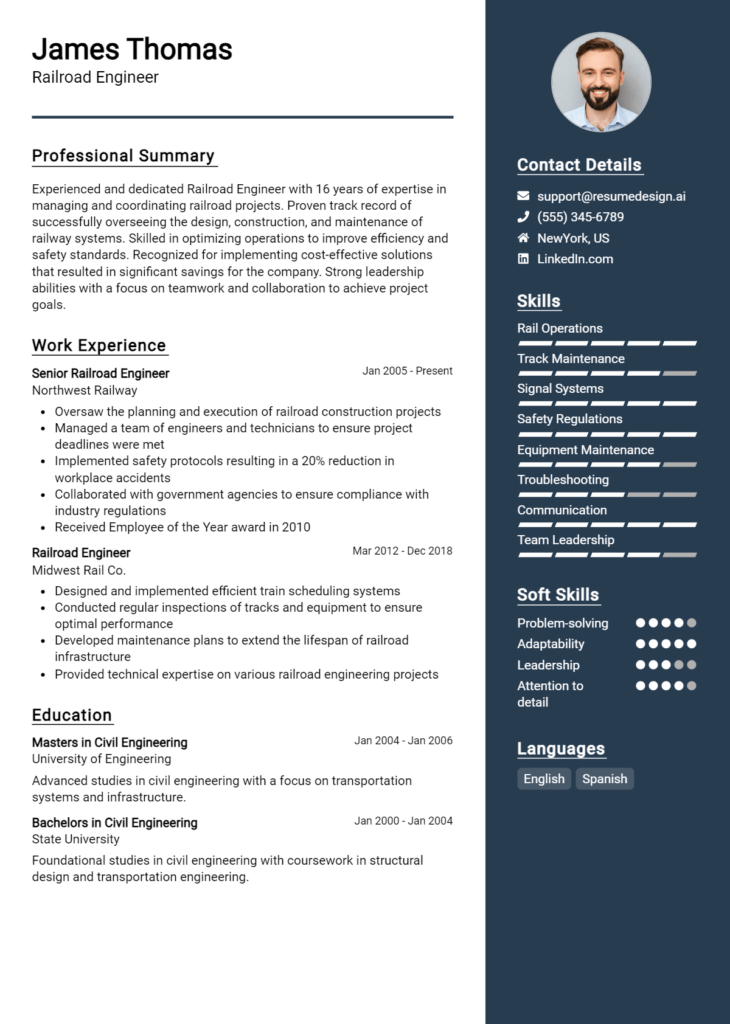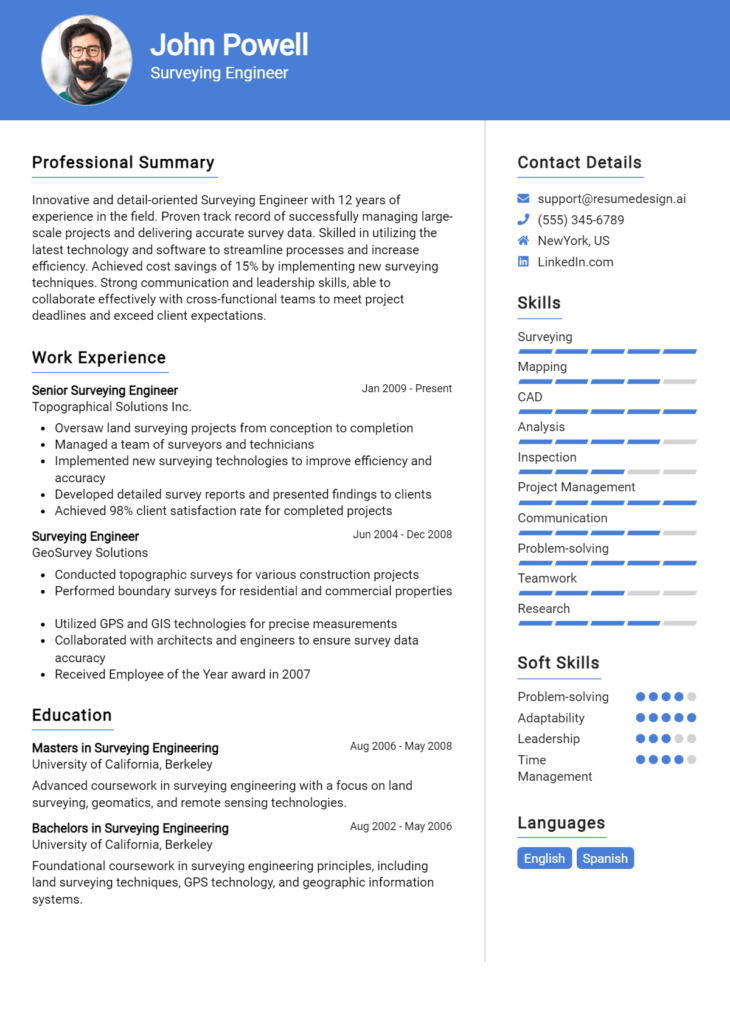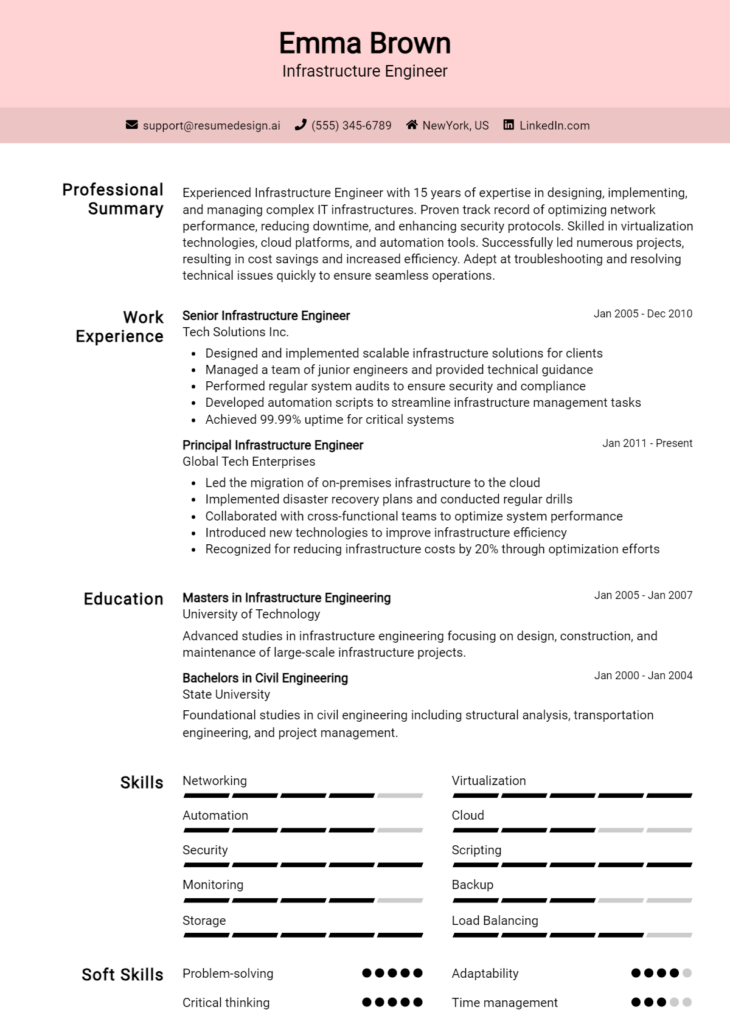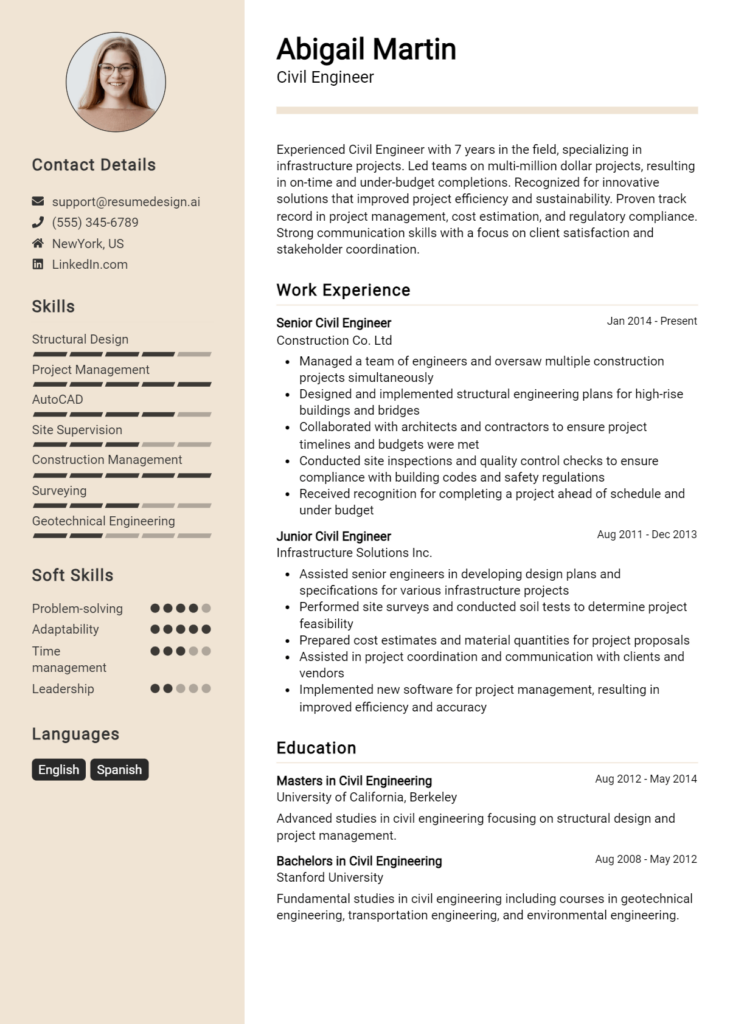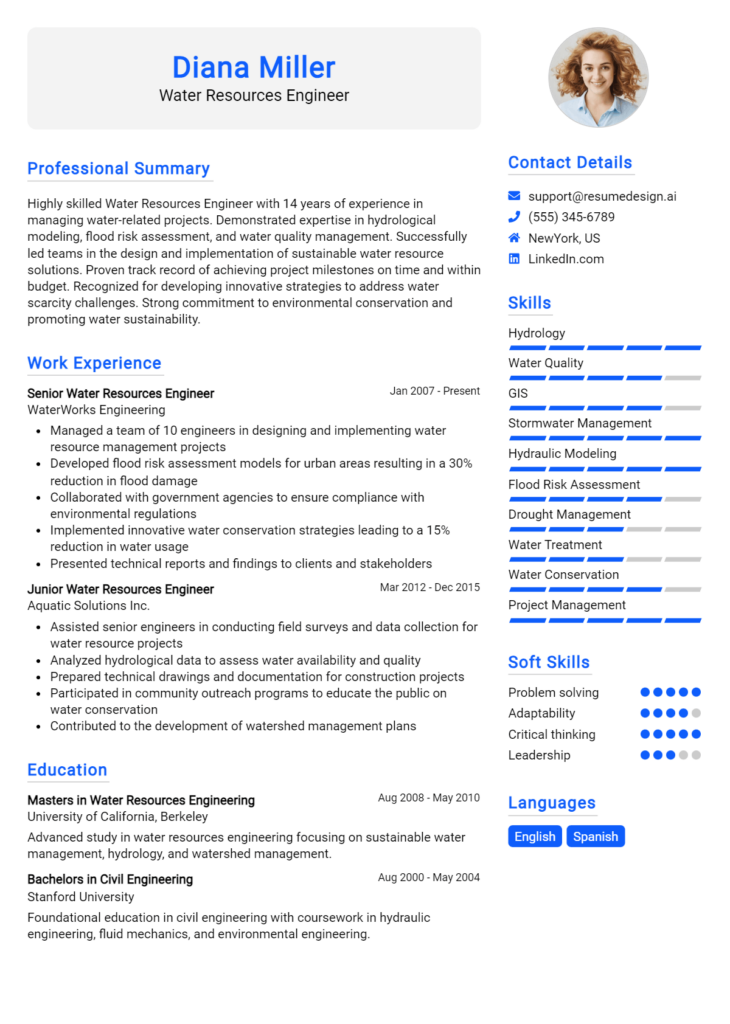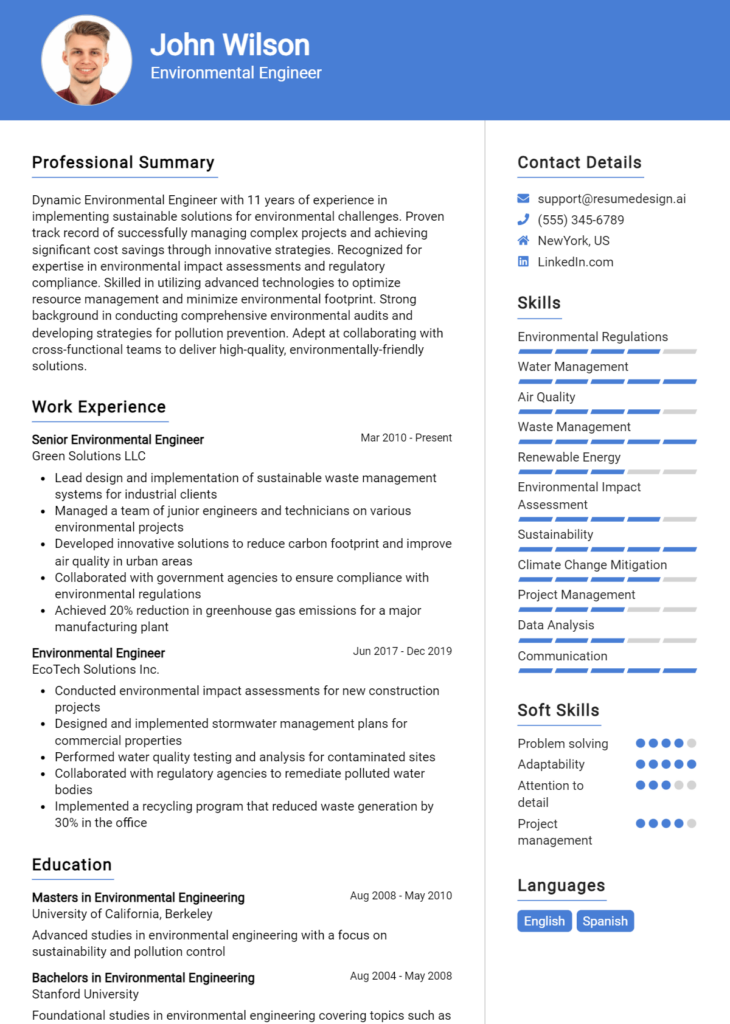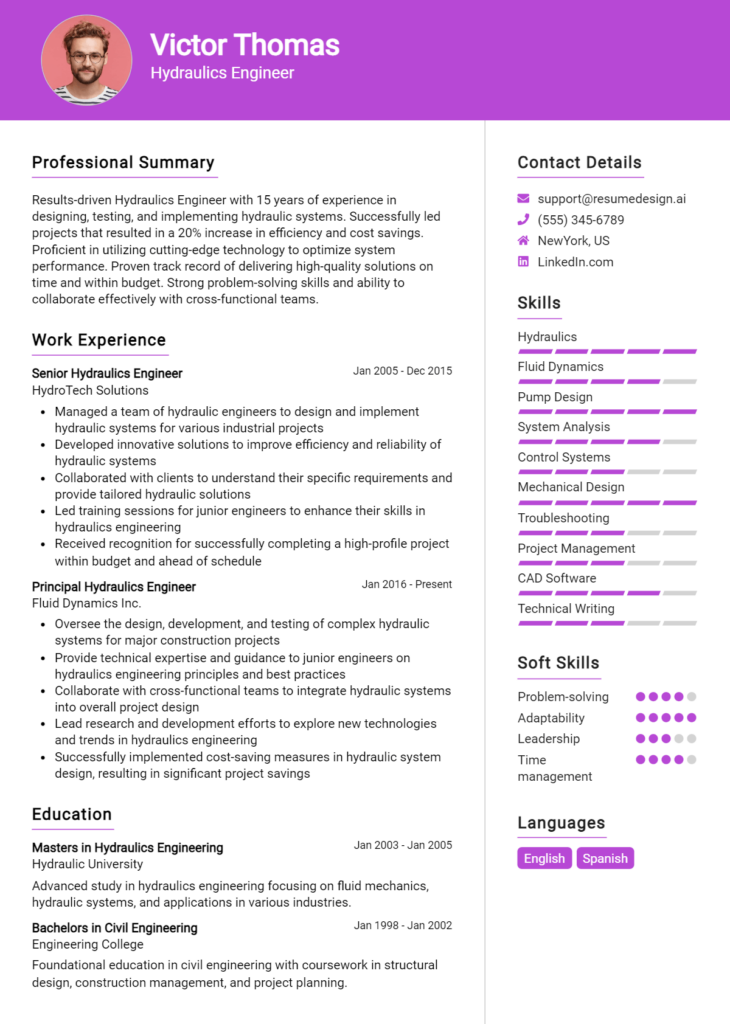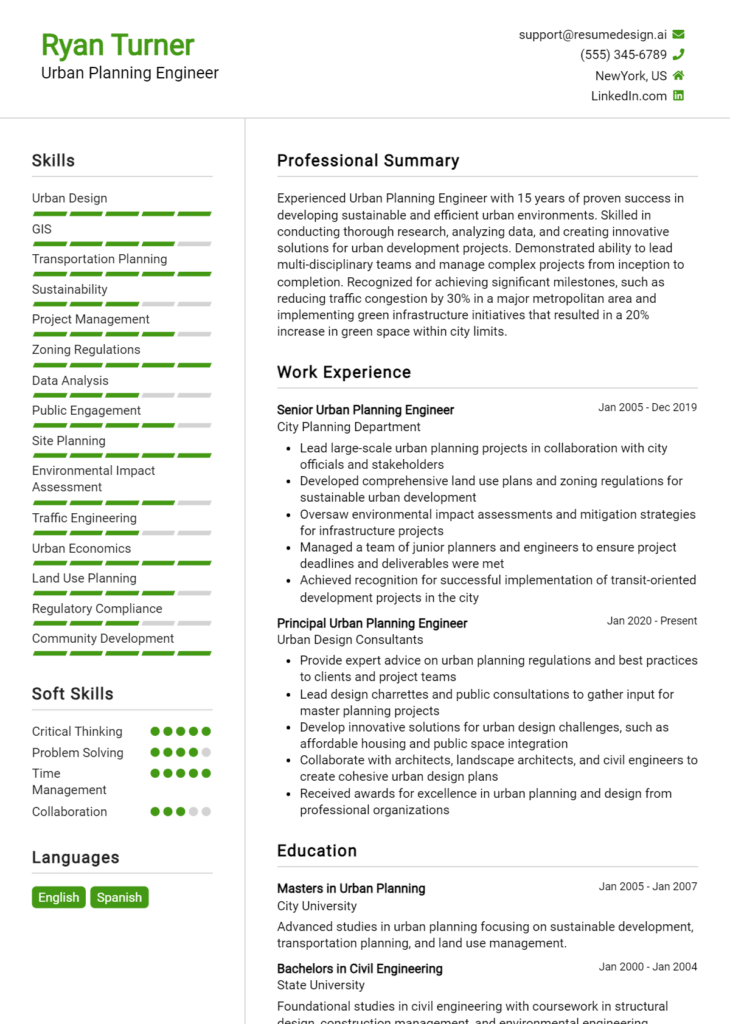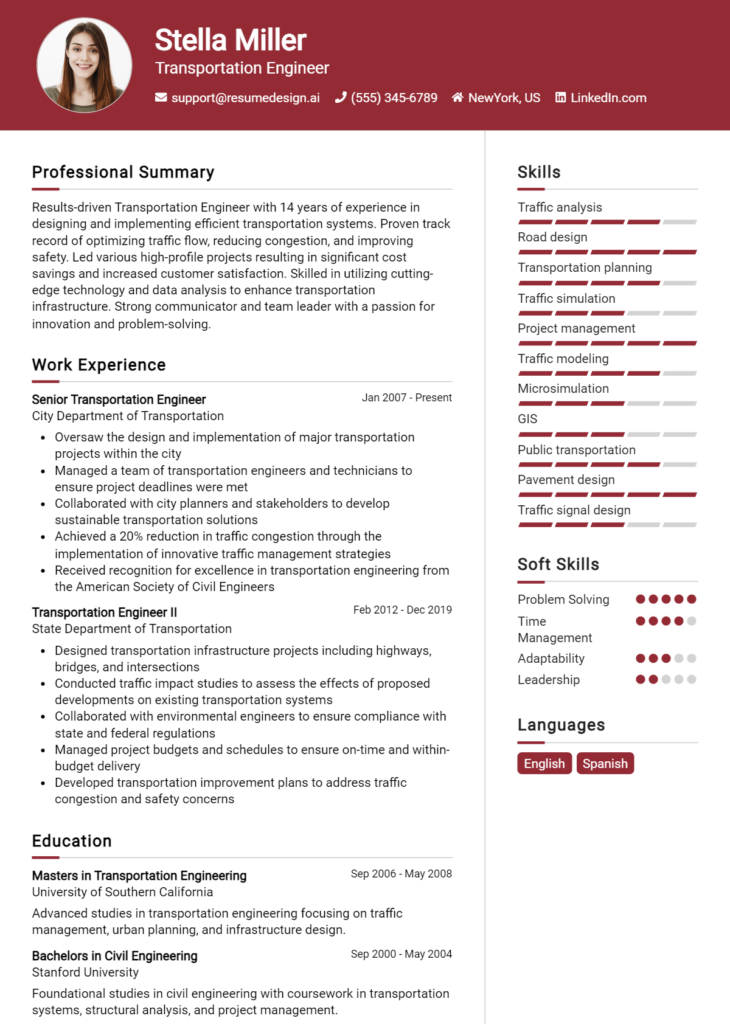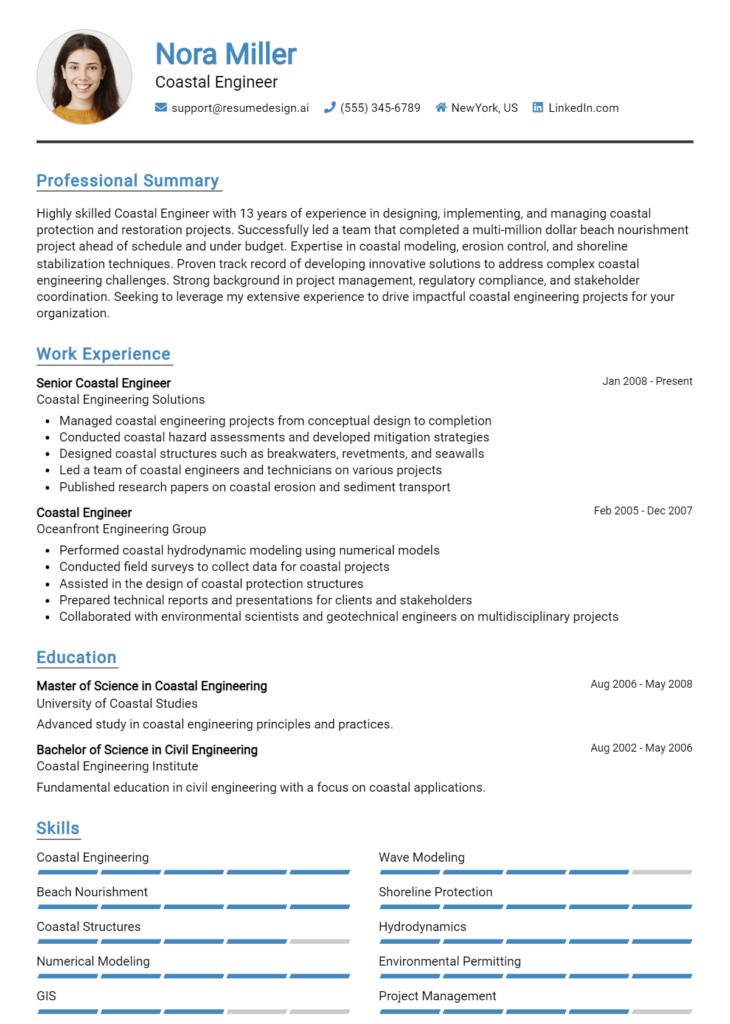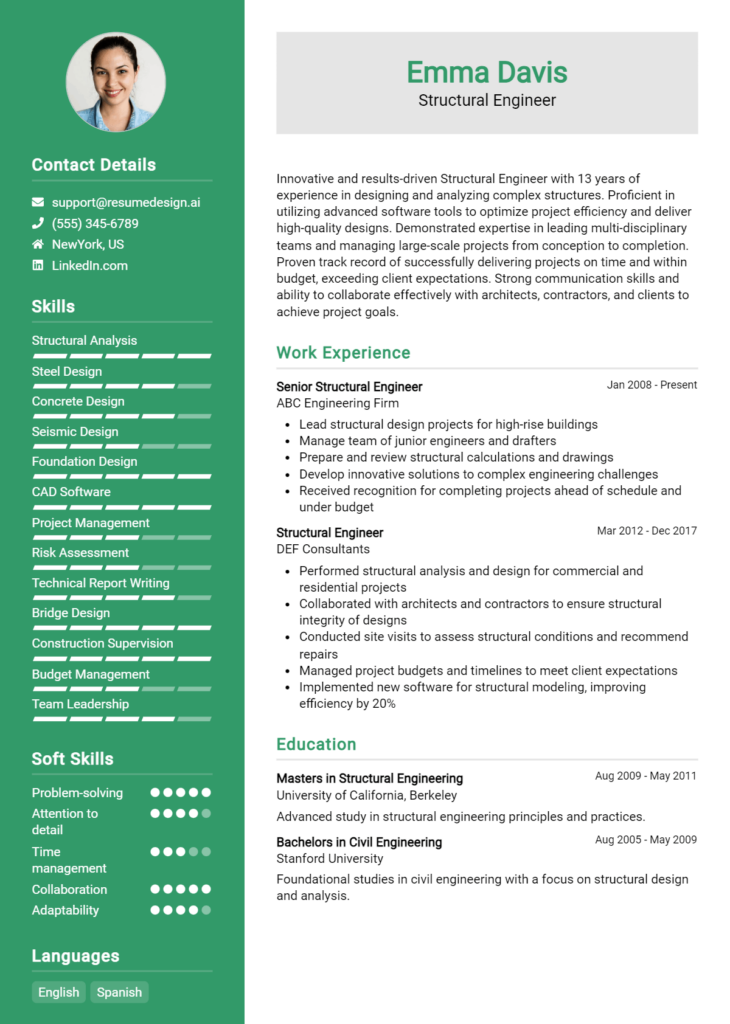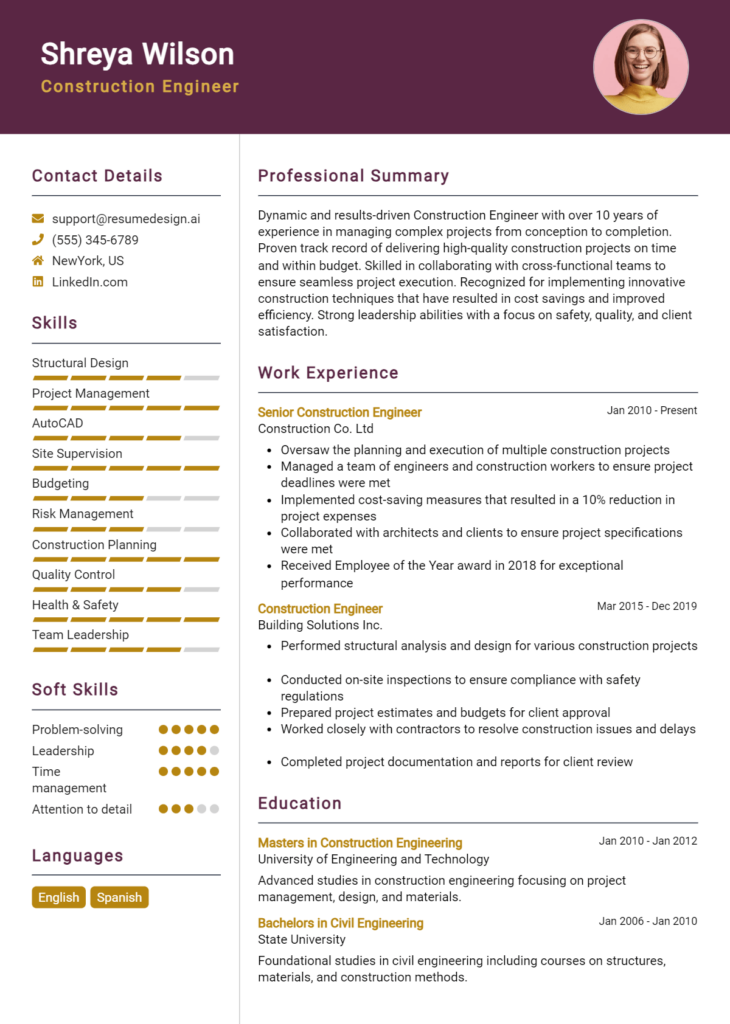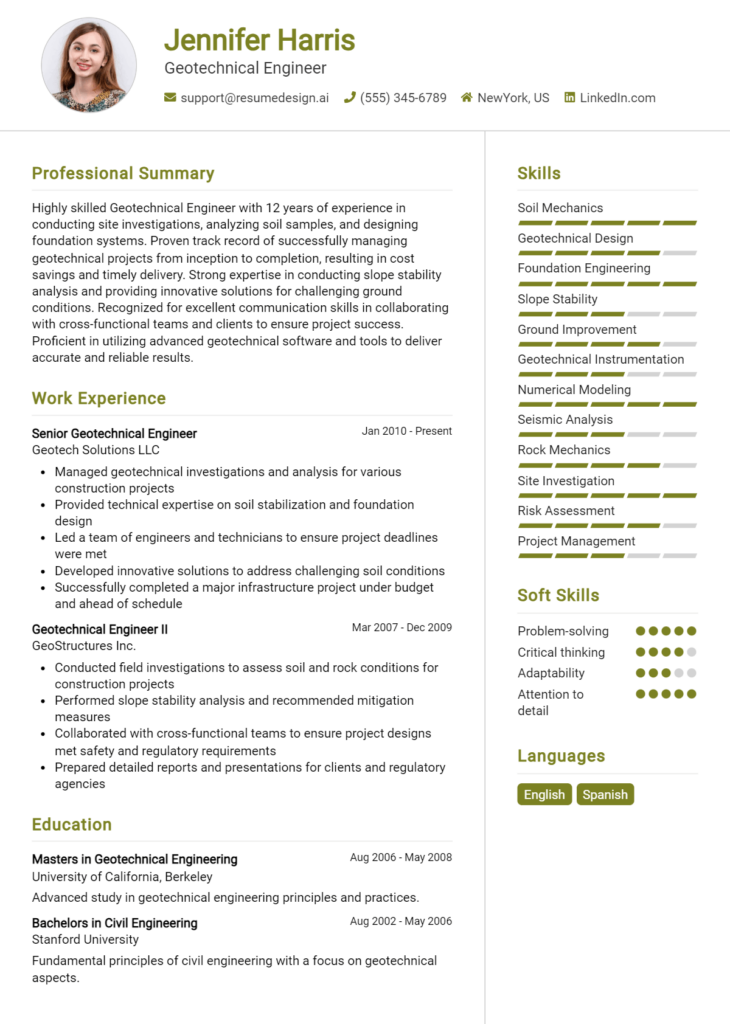Highway Engineer Core Responsibilities
A Highway Engineer plays a pivotal role in the planning, design, and maintenance of road systems, ensuring safety and efficiency. This professional must possess strong technical skills in civil engineering, operational expertise in project management, and exceptional problem-solving abilities to address complex challenges. Effective communication skills are essential for collaborating with various departments, such as environmental and urban planning, thereby aligning with organizational goals. A well-structured resume that highlights these qualifications can significantly enhance career prospects.
Common Responsibilities Listed on Highway Engineer Resume
- Conduct feasibility studies and traffic impact assessments.
- Design roadway layouts and drainage systems.
- Prepare and review engineering plans and specifications.
- Coordinate with local authorities and stakeholders on projects.
- Ensure compliance with safety and environmental regulations.
- Manage project timelines and budgets effectively.
- Analyze traffic patterns and propose improvements.
- Conduct site visits and inspections to monitor construction progress.
- Utilize software tools for modeling and simulations.
- Provide technical support and guidance to junior engineers.
- Prepare reports and presentations for stakeholders.
- Participate in public meetings and community outreach efforts.
High-Level Resume Tips for Highway Engineer Professionals
In today's competitive job market, a well-crafted resume is essential for Highway Engineer professionals seeking to make a strong impression on potential employers. Your resume often serves as the first point of contact, reflecting not only your technical skills but also your professional achievements and unique qualifications. It is crucial that your resume effectively communicates your expertise in highway design, construction, and maintenance, as well as your understanding of industry standards and regulations. This guide will provide practical and actionable resume tips specifically tailored for Highway Engineer professionals, helping you stand out in the field.
Top Resume Tips for Highway Engineer Professionals
- Tailor your resume to match the job description, highlighting specific skills and experiences that align with the employer's needs.
- Showcase relevant experience prominently, including internships or projects related to highway engineering.
- Quantify your achievements by including measurable results, such as project timelines, budget management, or safety improvements.
- Highlight industry-specific skills, such as proficiency in design software (e.g., AutoCAD, Civil 3D) and knowledge of local and federal regulations.
- Incorporate keywords from the job posting to optimize your resume for applicant tracking systems (ATS).
- Use clear and concise language, avoiding jargon that may not be understood by all readers.
- Include certifications and licenses that are relevant to highway engineering, such as Professional Engineer (PE) status.
- Provide a compelling summary or objective statement that conveys your career goals and what you can offer to the employer.
- List professional affiliations, such as memberships in engineering societies or organizations, to demonstrate your commitment to the field.
- Keep your resume organized and visually appealing, using appropriate headings and bullet points for easy readability.
Implementing these tips can significantly increase your chances of landing a job in the Highway Engineer field. A well-structured and tailored resume not only highlights your qualifications but also demonstrates your attention to detail and professionalism, qualities that are essential in engineering roles. By showcasing your skills and achievements effectively, you position yourself as a strong candidate ready to contribute to impactful highway projects.
Why Resume Headlines & Titles are Important for Highway Engineer
In the competitive field of highway engineering, a well-crafted resume headline or title can serve as a powerful first impression for hiring managers. A strong headline encapsulates a candidate's key qualifications and expertise in a succinct phrase, instantly grabbing attention and setting the tone for the rest of the resume. It should be concise, relevant, and tailored to the specific job being applied for, effectively summarizing what makes the candidate a standout choice for the position. By strategically using impactful phrases, candidates can ensure that they are perceived as competent professionals capable of contributing significantly to highway engineering projects.
Best Practices for Crafting Resume Headlines for Highway Engineer
- Keep it concise and to the point, ideally under 10 words.
- Use specific keywords related to highway engineering to enhance relevance.
- Highlight your most impressive qualifications or achievements.
- Tailor the headline to the specific job description for better alignment.
- Incorporate industry jargon or terminology to demonstrate expertise.
- Avoid generic phrases; instead, focus on your unique value proposition.
- Consider including years of experience or notable certifications.
- Make sure it reflects the level of the position you are applying for.
Example Resume Headlines for Highway Engineer
Strong Resume Headlines
"Experienced Highway Engineer with 10+ Years in Sustainable Infrastructure Development"
“Innovative Highway Engineer Specializing in Traffic Flow Optimization and Safety Solutions”
“Results-Driven Highway Engineer with Proven Track Record in Project Management and Design”
“Certified Professional Engineer (PE) with Expertise in Highway Design and Construction”
Weak Resume Headlines
“Engineer Looking for Opportunities”
“Highway Engineer”
“Resume of a Highway Engineer”
The strong headlines are effective because they clearly communicate the candidate's experience, specialization, and unique strengths, making them immediately relevant to the hiring manager. They utilize specific details and keywords that resonate with the demands of the highway engineering role, distinguishing the candidate from others. In contrast, the weak headlines fail to impress as they are overly vague and generic, lacking the specific information that would engage a potential employer's interest. They do not convey any compelling qualifications or insights about the candidate's expertise, making it difficult for hiring managers to see the value they could bring to the position.
Writing an Exceptional Highway Engineer Resume Summary
A well-crafted resume summary is crucial for a Highway Engineer as it serves as the first impression for hiring managers. This brief yet impactful section encapsulates the candidate’s key skills, relevant experience, and notable accomplishments, allowing them to quickly assess the applicant’s suitability for the role. A strong summary not only captures attention but also sets the tone for the rest of the resume, making it essential to ensure that it is concise, tailored to the specific job description, and highlights the most pertinent information that aligns with the job requirements.
Best Practices for Writing a Highway Engineer Resume Summary
- Quantify achievements: Use specific numbers and metrics to demonstrate your impact.
- Focus on relevant skills: Highlight skills that are directly applicable to highway engineering.
- Tailor the summary: Customize your summary for each job application to match the job description.
- Be concise: Keep your summary to 3-5 sentences for clarity and impact.
- Use action verbs: Start sentences with strong action verbs to convey confidence and initiative.
- Showcase certifications: Mention any relevant certifications or licenses that enhance your qualifications.
- Emphasize teamwork: Highlight experiences that demonstrate your ability to work collaboratively on projects.
- Include soft skills: Don’t forget to mention important soft skills like communication and problem-solving.
Example Highway Engineer Resume Summaries
Strong Resume Summaries
Results-driven Highway Engineer with over 8 years of experience in designing and overseeing large-scale highway projects, achieving a 20% reduction in project costs while enhancing safety measures. Proven expertise in utilizing advanced software tools to optimize design processes, resulting in a 30% increase in project efficiency.
Dedicated Highway Engineer with a successful track record of managing multi-million dollar infrastructure projects. Led a team that completed the XYZ Highway expansion ahead of schedule by 15%, resulting in improved traffic flow and a significant reduction in congestion.
Innovative Highway Engineer skilled in traffic flow analysis and pavement design, with over 5 years of experience. Successfully implemented sustainable practices in highway construction that reduced environmental impact by 25%, while ensuring compliance with state regulations.
Weak Resume Summaries
Highway Engineer with experience in various projects. Looking for a new opportunity to apply my skills and knowledge in a challenging environment.
Detail-oriented engineer with a background in civil engineering. I have worked on highways and am eager to contribute to a team.
The strong resume summaries are considered effective because they provide specific achievements, quantify results, and directly relate to key skills and experiences relevant to the Highway Engineer role. In contrast, the weak summaries lack detail, fail to showcase measurable outcomes, and are overly generic, making them less compelling to hiring managers.
Work Experience Section for Highway Engineer Resume
The work experience section of a Highway Engineer resume is a crucial component that highlights the candidate's technical skills, project management abilities, and commitment to delivering high-quality results. This section serves to demonstrate the practical application of engineering principles, showcasing how the candidate has successfully managed teams and executed complex projects. By quantifying achievements—such as completed projects, budget adherence, and timeline management—and aligning experiences with industry standards, candidates can effectively communicate their value to potential employers.
Best Practices for Highway Engineer Work Experience
- Focus on quantifiable results, such as project completion percentages, budget savings, or time efficiency improvements.
- Include specific technical skills relevant to highway engineering, such as roadway design software or traffic flow analysis techniques.
- Highlight leadership roles and team collaboration experiences to illustrate management capabilities.
- Use action verbs to convey a sense of initiative and impact, such as "led," "designed," or "implemented."
- Align your experiences with industry standards and regulations to show compliance and technical proficiency.
- Customize your work experience to match the requirements of the job you are applying for, emphasizing relevant projects.
- Incorporate feedback or testimonials from stakeholders to add credibility to your contributions.
- Keep descriptions concise yet informative, ensuring clarity and focus on your key achievements.
Example Work Experiences for Highway Engineer
Strong Experiences
- Led a team of engineers in the design and execution of a 15-mile highway expansion project, completing it 10% under budget and two months ahead of schedule.
- Implemented innovative traffic management solutions that reduced congestion by 25% during peak hours on a major urban thoroughfare.
- Managed the rehabilitation of a critical bridge, resulting in a 30% increase in load capacity while adhering to all safety regulations and standards.
- Collaborated with local government agencies to secure funding for a $5 million road improvement project, enhancing community accessibility.
Weak Experiences
- Worked on various highway projects without specifying roles or outcomes.
- Assisted in road design tasks that did not highlight specific contributions or results.
- Participated in meetings regarding traffic management but did not detail any implemented solutions.
- Involved in general engineering tasks without quantifying impact or describing responsibilities.
The examples listed above illustrate the distinction between strong and weak experiences in a resume. Strong experiences are effective because they provide specific, quantifiable outcomes, demonstrate leadership, and showcase successful collaboration. In contrast, weak experiences lack detail, clarity, and measurable impacts, making it difficult for employers to assess the candidate's contributions and skills. By presenting strong experiences, candidates can significantly enhance their appeal to potential employers in the highway engineering field.
Education and Certifications Section for Highway Engineer Resume
The education and certifications section of a Highway Engineer resume plays a crucial role in establishing the candidate's qualifications and expertise in the field. This section serves to highlight the candidate's academic background, showcasing degrees that are relevant to highway engineering, as well as industry-recognized certifications that indicate a commitment to professional development. By including pertinent coursework and specialized training, candidates can demonstrate their continuous learning efforts and enhance their credibility, aligning themselves more closely with the demands and expectations of the job role.
Best Practices for Highway Engineer Education and Certifications
- List degrees in reverse chronological order, starting with the most recent.
- Include only relevant certifications that pertain to highway engineering or related fields.
- Provide details about relevant coursework that directly relates to highway design, traffic engineering, or construction management.
- Highlight advanced degrees (e.g., Master's or Doctorate) that showcase specialized knowledge.
- Incorporate certifications from recognized industry organizations, such as the American Society of Civil Engineers (ASCE).
- Update the section regularly to include new certifications or courses completed.
- Use clear and concise language to describe educational qualifications, avoiding jargon.
- Consider including honors or awards that reflect academic excellence or professional achievement.
Example Education and Certifications for Highway Engineer
Strong Examples
- B.S. in Civil Engineering, University of California, Berkeley, 2020
- Certified Professional Engineer (PE), State of California, 2021
- Relevant Coursework: Transportation Engineering, Highway Design, Traffic Flow Theory
- M.S. in Civil Engineering (Transportation Focus), Georgia Institute of Technology, 2022
Weak Examples
- B.A. in History, University of Texas, 2015
- Certification in Project Management (outdated since 2018)
- Relevant Coursework: Introduction to Sociology
- Diploma in Construction Management (not recognized in engineering field)
The examples listed above are considered strong because they directly align with the qualifications required for a Highway Engineer position, showcasing relevant degrees, certifications, and coursework that demonstrate the candidate's expertise in the field. In contrast, the weak examples reflect educational qualifications and certifications that lack relevance to highway engineering, either because they pertain to different fields or are outdated, thereby undermining the candidate's credibility in the industry.
Top Skills & Keywords for Highway Engineer Resume
As a Highway Engineer, the significance of showcasing the right skills on your resume cannot be overstated. These skills not only reflect your technical expertise and problem-solving abilities but also demonstrate your capacity to work collaboratively within multidisciplinary teams and adapt to various project challenges. A well-crafted resume that highlights both hard and soft skills can make a substantial difference in attracting the attention of potential employers. By effectively communicating your abilities, you increase your chances of standing out in a competitive job market.
Top Hard & Soft Skills for Highway Engineer
Soft Skills
- Effective Communication
- Team Collaboration
- Problem Solving
- Critical Thinking
- Time Management
- Adaptability
- Leadership
- Attention to Detail
- Conflict Resolution
- Project Management
Hard Skills
- Civil Engineering Principles
- Geometric Design
- Traffic Engineering
- Pavement Design
- Surveying Techniques
- AutoCAD and Civil 3D Proficiency
- Structural Analysis
- Environmental Impact Assessment
- Construction Management
- Knowledge of Highway Safety Standards
By emphasizing these skills on your resume, you can effectively demonstrate your qualifications and enhance your appeal to prospective employers. For more insights on how to highlight your professional abilities, consider exploring additional resources on skills and work experience.
Stand Out with a Winning Highway Engineer Cover Letter
Dear [Hiring Manager's Name],
I am writing to express my interest in the Highway Engineer position at [Company Name] as advertised on [Where You Found the Job Posting]. With a degree in Civil Engineering and over [X years] of experience in highway design and project management, I am excited about the opportunity to contribute to your projects and help enhance transportation infrastructure. My hands-on experience in planning, designing, and supervising highway construction aligns well with the goals of your team, and I am eager to bring my expertise to [Company Name].
Throughout my career, I have successfully managed multiple highway projects from conception to completion. For instance, while working at [Previous Company Name], I led a team that designed a major highway expansion project that improved traffic flow by [X%] and significantly reduced congestion. This project required in-depth analysis, collaboration with various stakeholders, and meticulous attention to engineering standards. My ability to apply innovative solutions and adhere to strict timelines has always been a priority in my work, ensuring that all projects meet both regulatory requirements and the needs of the community.
I am particularly drawn to this opportunity at [Company Name] because of your commitment to sustainable and efficient transportation solutions. I am excited about the possibility of contributing to projects that not only enhance mobility but also consider environmental impacts. My proficiency in using advanced design software, along with my strong analytical and problem-solving skills, will enable me to effectively support your team in delivering high-quality highway engineering solutions.
Thank you for considering my application. I look forward to the opportunity to discuss how my background, skills, and enthusiasms can align with the innovative projects at [Company Name]. I am eager to bring my passion for highway engineering to your esteemed organization and contribute to building a safer and more efficient transportation network.
Sincerely,
[Your Name]
[Your Contact Information]
[Your LinkedIn Profile or Professional Website]
Common Mistakes to Avoid in a Highway Engineer Resume
When applying for a position as a Highway Engineer, it's crucial to present a resume that highlights your skills and experiences effectively. However, many candidates make common mistakes that can detract from their qualifications and reduce their chances of landing an interview. Understanding these pitfalls can help you create a more polished and impactful resume. Here are some frequent mistakes to avoid:
Generic Objective Statement: Using a vague objective that doesn't specifically relate to highway engineering can make your resume seem unfocused. Tailor your objective to reflect your career goals and how they align with the specific role.
Ignoring Keywords: Failing to incorporate relevant keywords from the job description can prevent your resume from passing through applicant tracking systems (ATS). Analyze the job posting and include specific terms that highlight your expertise.
Lack of Quantifiable Achievements: Merely listing duties without quantifying your achievements can diminish the impact of your experience. Use numbers and metrics to illustrate your contributions, such as project budgets managed or traffic improvements achieved.
Overly Technical Language: While technical skills are essential, overloading your resume with jargon can alienate hiring managers who may not be familiar with specific terms. Balance technical language with clear explanations of your skills.
Inconsistent Formatting: A cluttered or inconsistent format can distract from your qualifications. Ensure that your resume has a uniform layout, consistent font sizes, and clear headings for easy navigation.
Not Highlighting Relevant Projects: Failing to mention specific highway projects you've worked on is a missed opportunity to showcase your practical experience. Include projects that demonstrate your skills and success in the field.
Neglecting Soft Skills: Highway engineering is not just about technical expertise; soft skills like communication and teamwork are equally important. Be sure to highlight these skills and provide examples of how you've applied them in your work.
Lengthy Resume: Submitting a resume that is too long can overwhelm hiring managers. Aim for a concise, one-page resume that focuses on the most relevant information for the position you are applying for.
Conclusion
As a Highway Engineer, your role is crucial in the planning, design, and maintenance of roadways that support safe and efficient transportation. Throughout this article, we explored the core responsibilities of a Highway Engineer, which include conducting traffic studies, overseeing construction projects, and ensuring compliance with safety standards. We also highlighted the importance of collaboration with various stakeholders, from government agencies to community members, to create sustainable infrastructure that meets the needs of the public.
In addition, we discussed the essential skills required for success in this field, such as proficiency in engineering software, strong analytical abilities, and effective communication skills. The demand for skilled Highway Engineers continues to grow, making it a promising career path with ample opportunities for advancement.
Now that you have a comprehensive understanding of the Highway Engineer role, it’s the perfect time to reflect on your own qualifications and ensure your resume effectively showcases your skills and experiences. To aid you in this endeavor, consider utilizing available resources like resume templates, a resume builder, resume examples, and cover letter templates. These tools can help you create a standout application that aligns with industry standards and highlights your unique qualifications. Take action today and refine your Highway Engineer Resume to make a strong impression on potential employers!

